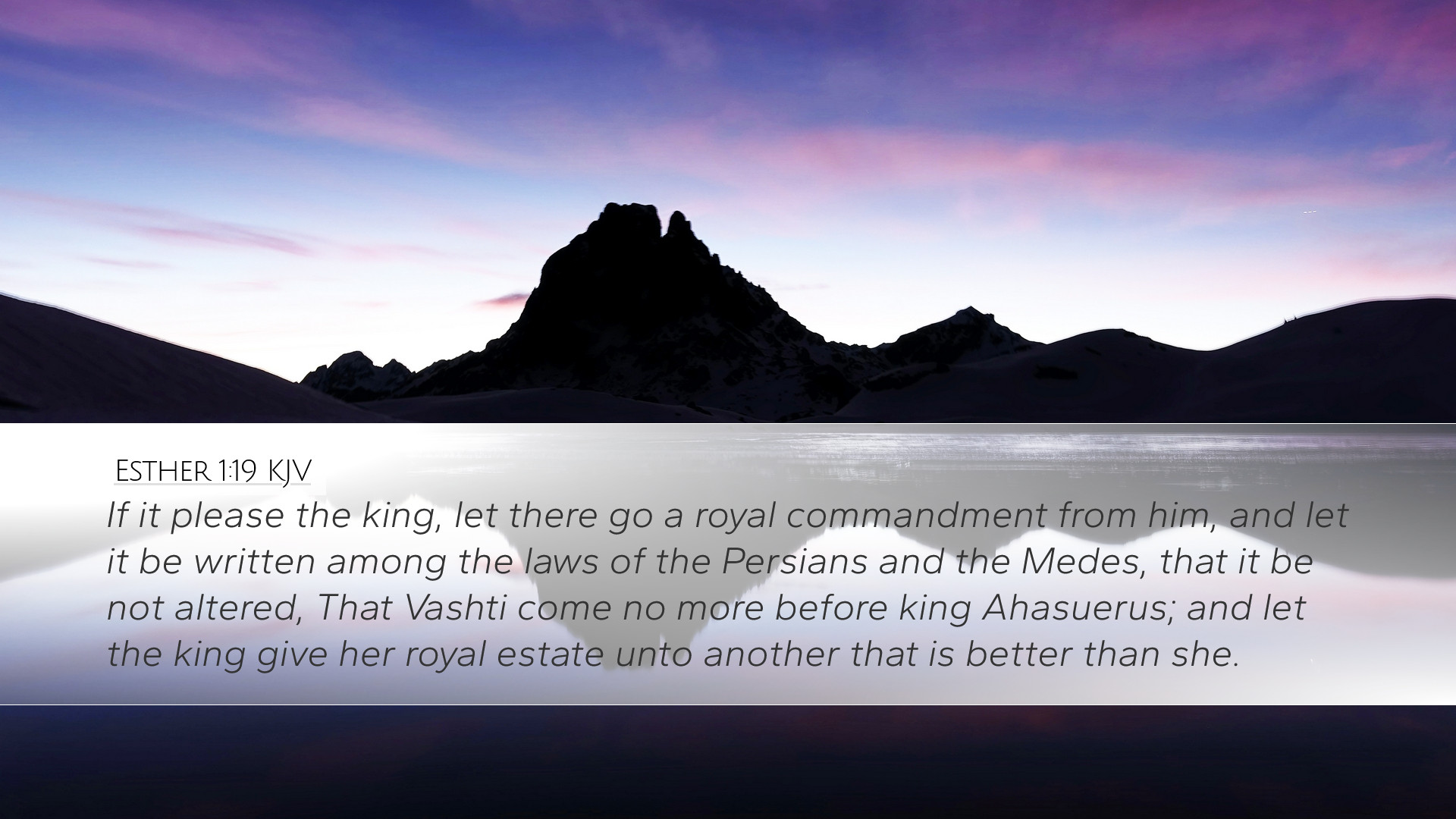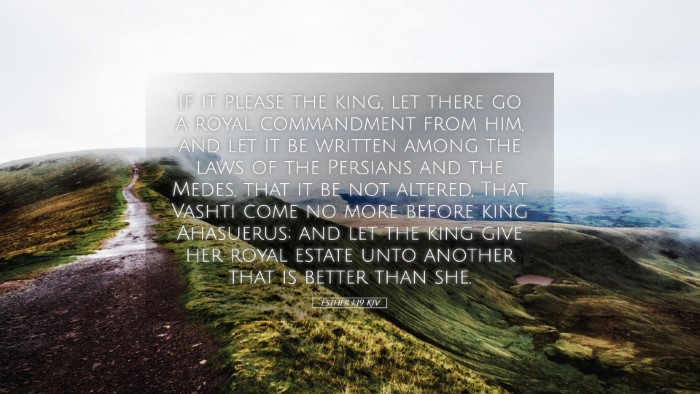Old Testament
Genesis Exodus Leviticus Numbers Deuteronomy Joshua Judges Ruth 1 Samuel 2 Samuel 1 Kings 2 Kings 1 Chronicles 2 Chronicles Ezra Nehemiah Esther Job Psalms Proverbs Ecclesiastes Song of Solomon Isaiah Jeremiah Lamentations Ezekiel Daniel Hosea Joel Amos Obadiah Jonah Micah Nahum Habakkuk Zephaniah Haggai Zechariah MalachiEsther 1:19
Esther 1:19 KJV
If it please the king, let there go a royal commandment from him, and let it be written among the laws of the Persians and the Medes, that it be not altered, That Vashti come no more before king Ahasuerus; and let the king give her royal estate unto another that is better than she.
Esther 1:19 Bible Commentary
Commentary on Esther 1:19
Bible Verse: "If it please the king, let there go a royal commandment from him, and let it be written among the laws of the Persians and the Medes, that it be not altered, that Vashti come no more before the king Ahasuerus; and let the king give her royal estate unto another that is better than she." (Esther 1:19, KJV)
Introduction
The Book of Esther presents a narrative filled with dramatic events that reflect the sovereignty of God and the intricate dynamics of human relationships. In Esther 1:19, we encounter a moment that signifies the themes of authority, the consequences of rebellion, and the setting of divine Providence in motion. This commentary draws insights from various public domain sources such as Matthew Henry, Albert Barnes, and Adam Clarke, offering a collective wisdom suitable for pastors, students, theologians, and Bible scholars.
Historical Context
Matthew Henry notes the significance of the royal court's atmosphere during the time of Ahasuerus (Xerxes I). Esteemed for his opulence, the king exemplified the political authority of the time. The dismissal of Vashti marked a pivotal moment in the Persian court, reflecting not only personal grievances but also broader sociopolitical tensions. The context aims to highlight the hierarchical structures prevalent in ancient regimes, where the king's word was law, and obedience was demanded.
Verse Analysis
Albert Barnes provides an analytical breakdown of the verse to unveil the implications of Vashti's refusal to appear before the king. Her act of defiance is emblematic of a deeper conflict regarding gender and power dynamics. The incident highlights the struggle between a woman's agency and the patriarchal expectations placed upon her. The phrase, "that it be not altered," signifies the permanence sought after by Ahasuerus in his laws, reflecting a common practice in Persian governance that sought to maintain authority and order.
Key Phrases Explained
- "If it please the king": This phrase indicates a formal tone and an appeal to the king's desire, showcasing the subservient nature of the courtiers.
- "let there go a royal commandment": This implies the importance and power of royal decrees, which held significant weight in governance.
- "that it be not altered": Barnes underscores that Persians valued absolute consistency in law, thus strengthening the severity of Vashti's punishment.
- "royal estate unto another that is better than she": This conclusion invites reflection upon the idea of merit and providence, suggesting that God has a plan that transcends human decisions.
Thematic Insights
Adam Clarke elaborates on the theological themes present in the unfolding drama of Esther. The dismissal of Vashti serves not only as a narrative pivot but also glorifies God's providential hand in the affairs of men. This verse signifies a moment of both loss and opportunity, particularly for the Jewish people in exile. Clarke's exposition notes that the decision to replace Vashti ultimately led to Esther's rise, bringing about a critical moment of deliverance for the Jewish nation.
The Role of Vashti
Vashti's actions provide a complex character study. While she embodies defiance against patriarchal oppression, she also represents a crucial turning point in God's plan. Matthew Henry emphasizes the moral implications of Vashti's disobedience; her choice highlights the tension between personal conviction and societal expectations. This dilemma resonates with modern issues of feminist discourse and the courage required to stand against unjust authority.
The Kingship of Ahasuerus
In observing Ahasuerus's reaction to Vashti's defiance, we see the fragility of human authority. Ahasuerus, while powerful, is depicted as insecure and reactionary. This serves as a pertinent reminder that earthly kingship, in all its grandeur, is subject to the plans of the Divine. Here, Clarke points out the contrast between the temporal kingship of Ahasuerus and the eternal kingship of God, who orchestrates events behind the scenes for ultimate good.
Lessons for Today
The narrative surrounding Esther 1:19 offers profound lessons for believers today. First, it prompts us to reflect on the nature of authority and submission within our lives. As church leaders, students, or theologians, one must grapple with how to balance personal convictions with respect for established authority. Second, it challenges us to consider how God may use our own acts of defiance or courage for his greater purpose, affirming that His plans often transcend our immediate understanding.
The Importance of Obedience
This passage emphasizes the weight of duty and expectation within the context of relationships, whether they be political, familial, or ecclesiastical. As noted by Henry, Vashti might have had justifiable reasons for her refusal, but her actions had irrevocable consequences. Today's readers are called to discern their own callings and the responses required in situations where obedience conflicts with personal integrity.
God’s Sovereignty in Human Affairs
Finally, the overarching theme of God’s sovereignty illustrated in Esther is an invaluable lesson. The unfolding of events in the Persian court, including decree and rejection, points toward divine providence in history. Both Clarke and Barnes affirm that God's unseen hand works through human decisions to fulfill His redemptive purposes. While we may not see the immediate impact of our actions, believers are encouraged to trust that God is weaving a greater narrative where every choice plays a part.
Conclusion
Esther 1:19 illustrates a profound nexus between human agency and divine orchestration. The insights drawn from established commentaries remind believers of the complexity of life under authority, the strength found in integrity, and the assurance that God’s providential plan prevails through seemingly mundane choices. As one reflects on this verse, may it serve as a catalyst for deeper understanding and richer faith.


